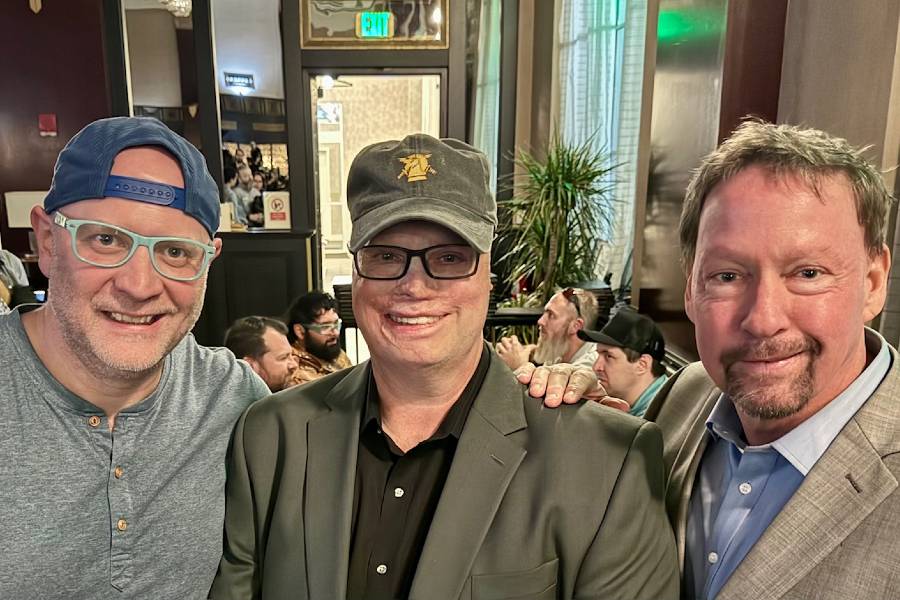McIntyre lends talent to healing veterans through storytelling in ‘Scars to Scripts’ performance at TPAC
Kim Chaudoin |

Nat McIntyre, left, and D.B. Sweeney, right, with a veteran as they prepare for the "Scars and Stripes" performance in Nashville April 13.
Nat McIntyre, assistant professor of theatre in Lipscomb University’s George Shinn College of Entertainment & the Arts, will take the stage April 13 at TPAC’s Johnson Theater to bring a veteran’s story to life as part of the CreatiVets’ Scars to Scripts program, an initiative designed to help combat veterans heal from the invisible wounds of war through the transformative power of the arts.
The performance features professional actors interpreting scripts written by veterans who are coping with post-traumatic stress (PTS). McIntyre will portray the lead role in one of the evening’s featured pieces, a narrative crafted by a veteran who served in combat.
“For me, this kind of work is what theatre is all about,” said McIntyre. “Programs like Scars to Scripts allow people to express themselves in ways that can lead to real healing. These aren’t abstract stories — they are deeply human, and these veterans are part of our community.”

McIntyre, who has been on Lipscomb’s faculty since 2014, was introduced to the program through actor D.B. Sweeney, a longtime advocate for veteran causes. The two had performed together in a reading for a new film when Sweeney shared the opportunity with him.
“I’ve always been drawn to creative and ‘nontraditional’ ways that theater can lift and change society,” McIntyre said. “So it was a no-brainer for me. I said yes immediately.”
That passion for the redemptive power of storytelling runs deep for McIntyre, who cites Brazilian theater director Augusto Boal’s Theatre of the Oppressed as a major influence. “Boal believed that theater becomes a source of healing when the participants are members of the community seeking that healing,” said McIntyre. “That’s exactly what this program is doing.”
The Scars to Scripts program is one of several initiatives by CreatiVets, a national nonprofit dedicated to helping disabled veterans cope with the trauma of war through artistic expression. Veterans enrolled in the program learn the craft of screenwriting and have the opportunity to see their work performed by professional actors in front of a live audience.
The impact is profound. According to CreatiVets, veterans suffering from PTS often relive traumatic experiences long after returning home, resulting in social isolation, depression, substance abuse and suicide. The organization’s programs, which include songwriting, visual arts and creative writing, create safe spaces for veterans to process trauma and reconnect with others.
McIntyre said his preparation for this performance has already deepened his understanding of the veteran whose story he will tell. “It’s given me a much deeper appreciation for this one soldier’s journey,” he said. “These aren’t people who are separate from us — they’re part of our neighborhoods, our classrooms, our churches. They should be part of our lives.”
A Massachusetts native, McIntyre has spent more than two decades acting, directing and teaching in theaters across the country, from Broadway to Nashville. In addition to his work at Lipscomb, he continues to perform with local theater companies such as Studio Tenn, Nashville Shakespeare Festival and Nashville Repertory Theatre.
McIntyre has devoted his career to theatre and the arts because he sees it as a uniting force.
“I was recently thinking about this backstage of a play I am currently acting in. I looked out at the audience in Franklin. I thought, ‘they are all so different!’” he explained. “How amazing is it that we have this art form where people of different backgrounds, political beliefs, ages, and such can sit in a room together and experience the same story live and breathing in front of them? And, we all leave a play different (actors included) than when we entered the theatre. In a time where we are so divided that is a gift and I think it is incredibly important.”
Throughout his career, McIntyre has gravitated toward theatre that invites dialogue, empathy and transformation. He recalled a past production in which he portrayed a police officer involved in a tragic shooting. During a post-show discussion, a group of young African American teenagers and a police officer in the audience found common ground in their shared reactions to the play.
“To listen to them speak honestly, to watch them cry together — it was one of the most profound experiences of my life,” said McIntyre. “That’s what this art form can do. It brings us to the table.”
Scars to Scripts takes place Sunday, April 13 at 5 p.m. at TPAC’s Johnson Theater in downtown Nashville. For more information and tickets, click here.